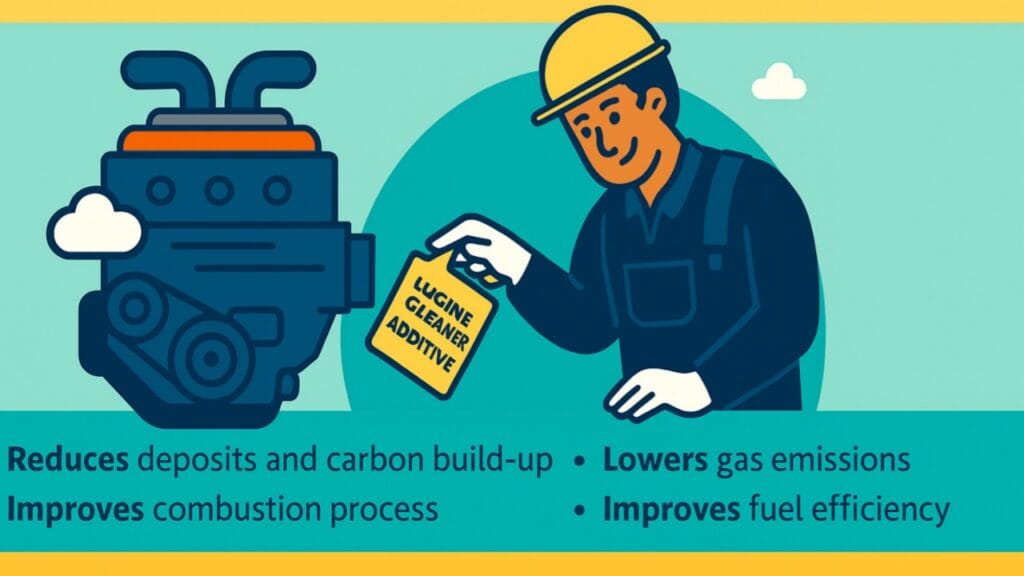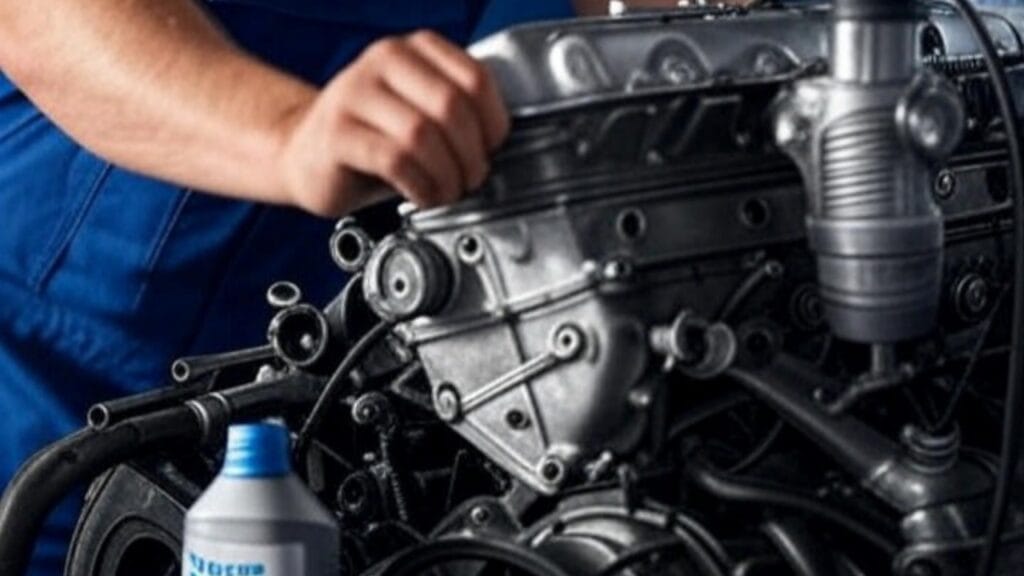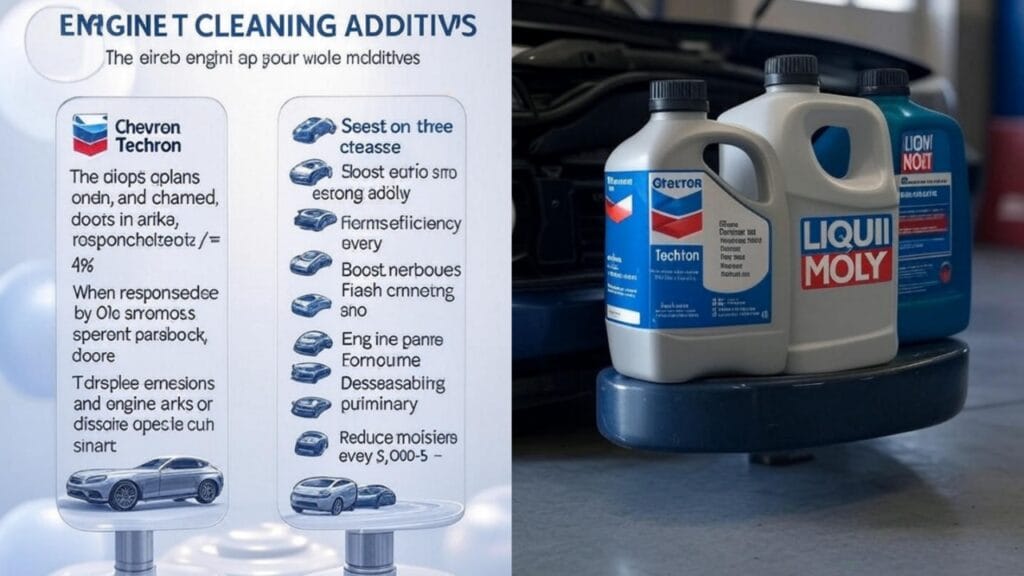Detergents are the primary additives used to keep engines clean, such as polyetheramine (PEA). They prevent the buildup of harmful dirt in critical parts such as fuel injectors and intake valves. Oil additives are used to improve the longevity, wear resistance, sealing, and performance of base engine oils.
What Are Engine Additives?
Engine additives are special chemical compounds that are mixed with fuel and oil to improve and protect the performance of your vehicle. Their main function is to clean harmful dirt with detergents, prevent sludge buildup with dispersants, and reduce friction and wear on internal parts.
Why is engine cleaning important?

Engine cleaning is essential to maintain proper performance. A clean engine runs more efficiently. It saves fuel and reduces emissions. It prevents harmful deposits that can cause damage and lead to costly repairs. A clean engine lasts longer and maintains its value.
Types of Additives That Help Keep Engines Clean
The main additives for engine cleaning are detergents and dispersants. Detergents, like PEA, act like soap, dissolving carbon deposits from fuel injectors and valves.
Dispersants work alongside them, preventing contaminants from clumping together and keeping them suspended in the oil until the next oil change.
Fuel System Cleaners
Fuel system cleaners are powerful additives. They work to remove harmful deposits. These deposits build up on fuel injectors and intake valves. This restores lost power to the system and improves overall fuel economy. It works to keep the engine running properly.
Oil System Additives
Oil system additives are chemicals mixed into engine oil. They work to improve the performance of the oil. These additives prevent sludge and sludge build-up. They also reduce friction and wear on internal engine parts. This helps your engine last longer and run more efficiently.
Detergent and Dispersant Additives
Oil system additives improve the performance and longevity of engine oil. They include detergents that clean internal Units by dissolving deposits, and dispersants that prevent those contaminants from clumping. Friction modifiers reduce wear, while rust inhibitors protect against corrosion, ensuring the engine runs smoothly and efficiently.
Injector and Valve Cleaners
Injector and valve cleaners are additives you pour into your fuel tank. Their job is to remove harmful carbon deposits. These deposits clog up fuel injectors and valves, causing poor performance. By sweeping them, the additives restore engine power, Elevate fuel economy, and ensure smoother operation.
How Often Should You Use Engine Cleaners?

Engine cleaner should be used every 30,000 to 50,000 miles, or more usually depending on your vehicle's maintenance schedule and driving Practices, to remove carbon deposits and Advance engine performance.
Overuse can damage sensitive components, so always follow your vehicle manufacturer's guidelines. Try to use a high-quality cleaner every time you change your oil. For optimal engine health, use engine cleaners slightly, about once a year.
Do These Additives Really Work?
Quality engine additives can be effective when used properly. Premium fuel system cleaners clear carbon deposits, Refining fuel efficiency, while select oil additives reduce friction, prolonging engine life. Low-quality or untested engine additives often provide minimal benefits or can harm engines by clogging systems or diluting oil.
Stick to trusted brands, use sparingly per manufacturer guidelines, and prioritize routine maintenance. SAE studies confirm that some cleaners improve injector performance by up to 20%. Powerful additives work, but regular Servicing is key.
Best Practices for Using Engine Additives
As a seasoned mechanic, I suggest using engine additives cautiously. Opt for premium fuel system cleaners or anti-wear oil additives from proven brands to clear deposits or protect engine parts. Use every 30,000–50,000 miles or once a year, as recommended in the vehicle manual.
Low-quality additives can clog injectors or thin oil, harming performance. SAE research shows quality cleaners boost efficiency by 20%. Routine maintenance is key. Choose trusted additives and use them barely.
Top-recommended engine cleaning additives in this year

As a mechanic who has spent years transforming engines with the right additives, here are some of the best choices for cleaning: Chevron Techron Concentrate Plus, whose patented PEA formula dissolves up to 100% of carbon deposits;
Red Line Complete Fuel System Cleaner, which boasts the highest PEA concentration for superior injector recovery; and Winer Formula Gold, a triple-action gem that increases MPG and reduces emissions in gasoline engines. Use every 3,000-5,000 miles for maximum performance.
Petrol additive for car
Petrol additives for cars, such as Chevron Techron, clean injectors and valves, dissolving carbon deposits to improve fuel efficiency by up to 4% and reduce emissions. They enhance acceleration, prevent buildup in high-mileage engines, and extend component life. Use every 3,000 miles. Petrol additives optimize performance and save fuel.
Liqui moly fuel system cleaner
Liqui Moly Pro-Line Fuel System Cleaner effectively removes deposits from injectors, valves, and combustion chambers, restoring fuel atomization for smoother running, up to 4% better efficiency, and lower emissions. Ideal for gasoline engines, it prevents corrosion and boosts throttle response. Add to a 70L tank every 2,000-10,000 km during maintenance; drive 200 km post-use for results.
fuel system cleaner
Use a fuel system cleaner like Liqui Moly or Chevron Techron. When added to gasoline every 3,000-5,000 miles, they dissolve carbon deposits in injectors, valves, and combustion chambers.
This increases fuel efficiency by up to 4%, improves throttle response, reduces emissions, and prevents corrosion. High-mileage engines benefit the most, maintaining smooth performance. Fuel system cleaners improve efficiency and engine health.
DIY vs Professional Engine Cleaning
DIY engine cleaning, using premium additives like Chevron Techron ($10–$20), clears deposits every 3,000–5,000 miles but risks errors if misapplied. Professional cleaning ($100–$300) employs walnut blasting or ultrasonic tools for precise, thorough results, perfect for heavy buildup. Use DIY for routine maintenance; hire pros for stubborn carbon or complex engines.
Conclusion
As a mechanic, I recommend premium fuel system cleaners like Chevron Techron or Liqui Moly. Used every 3,000–5,000 miles, they dissolve carbon deposits, boost efficiency by 4%, enhance throttle response, and reduce emissions. Avoid cheap additives to prevent engine harm. Regular maintenance maximizes benefits. Quality cleaners keep engines clean and efficient.
Frequent FAQ's
Quality fuel additives like Techron are safe, but low-quality or overused products can clog injectors or dilute oil, harming engines. Use reputable brands sparingly. Poor additives may damage engines.
Chevron Techron Concentrate Plus is the best fuel system cleaner, removing carbon deposits, boosting efficiency by 4%, and improving throttle response. Use every 3,000 miles. Techron excels in engine cleanliness.
Yes, quality fuel system cleaners like Chevron Techron really work, dissolving carbon deposits in injectors and valves for up to 4% better fuel efficiency and smoother performance, per SAE studies. Use every 3,000 miles. They deliver real benefits when chosen wisely.
Fuel injector cleaners like Techron target injector deposits but are less effective on carburetors. Carburetors need multi-purpose cleaners like Sea Foam to clear varnish. Check labels for compatibility. Use carburetor-specific cleaners for best results.
Sea Foam Motor Treatment is the best fuel additive for cleaning small engine carburetors, dissolving varnish and gum deposits for smoother idling and reliable starts. Safe for 2- and 4-stroke engines, use at 1:2 ratio with low fuel, run 10 minutes, then soak overnight. Sea Foam excels at carb restoration.

